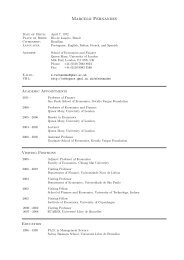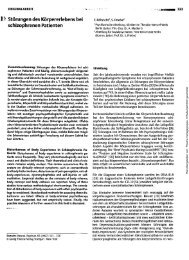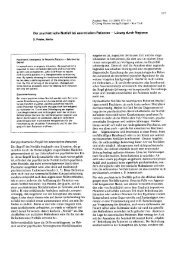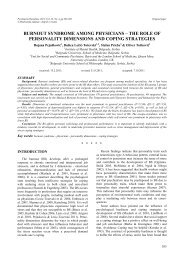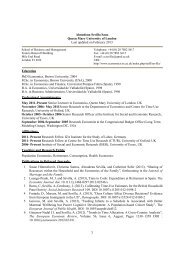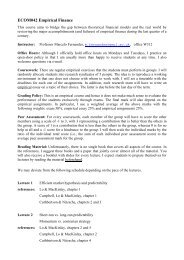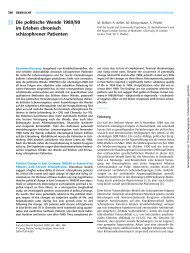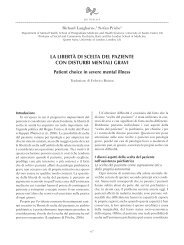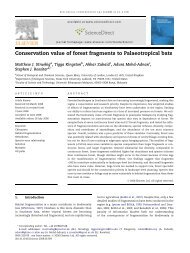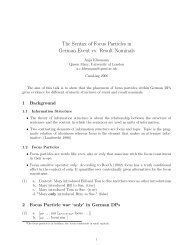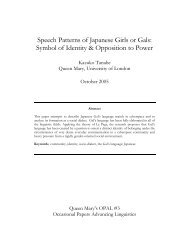Proofs - Personal Webspace for QMUL - Queen Mary, University of ...
Proofs - Personal Webspace for QMUL - Queen Mary, University of ...
Proofs - Personal Webspace for QMUL - Queen Mary, University of ...
You also want an ePaper? Increase the reach of your titles
YUMPU automatically turns print PDFs into web optimized ePapers that Google loves.
S54 A. Vardar et al. / European Psychiatry 27 (2012) / supplement n°2 / S50-S55<br />
although using different terms. While native Germans speak<br />
explicitly <strong>of</strong> “psychotherapy/psychotherapists”, Turkish immigrants<br />
name “therapy/therapist”. To what extent these terms<br />
are connected to the same meaning has yet to be proven in the<br />
next step <strong>of</strong> the research, the Pile Sorts. In general, the answers<br />
concerning pr<strong>of</strong>essional help resemble each other in the three<br />
groups and can be interpreted as low infl uence <strong>of</strong> cultural differences.<br />
This is strengthened by the fact that no “traditional”<br />
help possibilities like hocas were mentioned which extends<br />
Penka’s [16] fi ndings that hocas do not play an important role<br />
<strong>for</strong> young Turkish immigrants in seeking help from drug addiction.<br />
Thus our fi ndings show that no major cultural divide along<br />
spiritual versus medical lines can be observed as some studies<br />
suggested [2]. Yet as barriers to the mental health care system<br />
in Germany can still be observed <strong>for</strong> immigrants [9,15], these<br />
may not only lie in different ways <strong>of</strong> expressing mental disorders<br />
but problems in communication, e.g. not feeling understood by<br />
pr<strong>of</strong>essionals.<br />
The strength <strong>of</strong> the study is its semi- qualitative approach.<br />
By using open questions interviewees could list items that<br />
were truly relevant <strong>for</strong> them. This explorative method is complemented<br />
by counting the frequencies <strong>of</strong> so found categories<br />
and comparing them among groups. As a result the complexity<br />
and heterogeneity in expressing mental health problem can be<br />
illustrated. Limitations <strong>of</strong> the study are that the fi ndings reveal<br />
vocabulary concerning mental health problems but not the way<br />
people act or decide in concrete situations. As the Free Listing is<br />
the fi rst step <strong>of</strong> the research, the next step (Pile Sorts) will show<br />
how the categories are connected to each other.<br />
While most <strong>of</strong> the literature points out to different health<br />
beliefs <strong>of</strong> Turkish immigrants and relate them to tradition,<br />
this study shows that there is a large diversity in the Turkish<br />
community concerning expressing mental health problems.<br />
Especially concerning pr<strong>of</strong>essional help possibilities (Table 4),<br />
answers between native Germans and Turkish immigrants<br />
just vary slightly. The differences in answering behaviour<br />
according to sub groups matches the results <strong>of</strong> the representative<br />
Sinus study [21] that analyzed everyday life worlds <strong>of</strong><br />
immigrants in Germany. The results point out to the fact that<br />
immigrants with the same ethnic background may belong<br />
to quite different everyday- life worlds with different norms<br />
and different sub- cultures. Also Bollini and Siem [3] point<br />
out to the fact that social background <strong>of</strong> patients is crucial<br />
<strong>for</strong> utilisation praxis.<br />
For the practical work with patients the results implicate the<br />
importance <strong>for</strong> looking at each case individually, not ignoring<br />
cultural factors as well as considering the social and educational<br />
background. The avoidance <strong>of</strong> generalizations is important as<br />
health beliefs <strong>of</strong> patients <strong>of</strong> the same ethnic origin may vary considerably.<br />
One should be careful to judge immigrants’ behaviour<br />
through the “cultural” lens like Kürşat- Ahlers stated “It is as if<br />
Turkish people have culture and Germans have a psyche” [18].<br />
There<strong>for</strong>e it is useful to keep in mind the questions Kleinman noted<br />
to elicit concrete explanatory models3 [10], i.e. to ask patients<br />
3 The questions are: What do you call this problem? What do you believe<br />
is the cause <strong>for</strong> this problem? What course do you expect it to take? How<br />
serious is it? What do you think does the problem inside your body? How<br />
does it affect your body and your mind? What do you fear most about this<br />
condition? What do you fear most about the treatment?<br />
<strong>for</strong> their assumptions about their illness. Using these questions<br />
pr<strong>of</strong>essionals can avoid to walk right into the cultural trap but<br />
still be aware <strong>of</strong> different ways <strong>of</strong> thinking patients might have.<br />
Acknowledgements<br />
The study is funded by the VW-foundation (VW-AZ 84336)<br />
and supported by the German Federal Ministry <strong>of</strong> Education and<br />
Research (BMBF 01 EL 0807).<br />
Confl ict <strong>of</strong> interest statement<br />
None.<br />
References<br />
[1] Akguel G, Schmid-Ott G. Einstellung gegenüber der Psychotherapie in<br />
der deutschen Bevölkerung und bei türkischen Migranten/-innen in<br />
Deutschland. In: Neises M, Schmid-Ott G, editors. Gender, kulturelle<br />
Identität und Psychotherapie. Lengerich, Berlin, Bremen, Miami, Riga,<br />
Viernheim, Wien, Zagreb: Pabst Science Publishers; 2007. p. 171–188.<br />
[2] Assion HJ. Traditionelle Heilpraktiken bei türkischen Migranten. Berlin:<br />
VWB Verlag für Wissenschaft und Bildung; 2004.<br />
[3] Bollini P, Siem H. No real progress towards equity: health <strong>of</strong> migrants<br />
and ethnic minorities on the eve <strong>of</strong> the year 2000. Social Science and<br />
Medicine. 1995; 41: 819-828.<br />
[4] Borgatti SP. Elicitation techniques <strong>for</strong> cultural domain analysis. In:<br />
Schensul JS, LeCompte MD, Nastasi BK, Borgatti SP, editors. Enhanced<br />
ethnographic methods. Audiovisual techniques, focused group interviews,<br />
and elicitation techniques. Walnut Creek, London, New Delhi:<br />
Altamira Press; 1999. p. 115–151.<br />
[5] David M, Borde T. Warum bin ich krank? Kulturell-ethnische Aspekte<br />
der subjektiven Krankheitstheorie am Beispiel türkischstämmiger<br />
Migrantinnen. In: Neises M, Schmid-Ott G, editors. Gender, kulturelle<br />
Identität und Psychotherapie. Lengerich, Berlin, Bremen, Miami, Riga,<br />
Viernheim, Wien, Zagreb: Pabst Science Publishers; 2007. p. 133–143.<br />
[6] Franz M, Lujic C, Koch E, Wüsten B, Yürük N, Gallh<strong>of</strong>er B. Subjektive<br />
Krankheitskonzepte türkischer Migranten mit psychischen Störungen.<br />
Besonderheiten im Vergleich zu deutschen Patienten. Psychiatrische<br />
Praxis. 2007;34: 332–338.<br />
[7] Gaitanides S. Zugangsbarrieren von Migranten zu den Drogendiensten.<br />
In: Deutsche Hauptstelle gegen die Suchtgefahren e.V.. Sucht in unserer<br />
multikulturellen Gesellschaft. Freiburg im Breisgau: Lambertus-Verlag;<br />
1998. p. 62–76.<br />
[8] Hunner C, Penka S, Krieg S, Heinz, A. Latente Ausschließung: Migranten<br />
und Drogenhilfe. Kriminologisches Journal. 2001; 33(3): 216–224.<br />
[9] Kirmayer LJ, Weinfeld M, Burgos G, du Fort GG, Lasry JC, Young A. Use <strong>of</strong><br />
health care services <strong>for</strong> psychological distress by immigrants in an urban<br />
multicultural milieu. Can J Psychiatry. 2007;52(5): 295-304.<br />
[10] Kleinman A, Benson P. Anthropology in the clinic. The problem <strong>of</strong> cultural<br />
competency and how to fi x it. PLoS Med. 2006[cited 2009 Dec<br />
30];10(3): 1673-1676. Available from: http://www.plosmedicine.org/<br />
article/info:doi/10.1371/journal.pmed.0030294.<br />
[11] Koch E. Gefahren der Chronifi zierung. Psychosomatische Krankheiten in<br />
der ärztlichen Versorgung türkischer Patienten. Die Krankenversicherung<br />
(KrV). 2003: 305–308.<br />
[12] Lamnek S. Qualitative Sozial<strong>for</strong>schung. Weinheim, Basel: Beltz Verlag; 2005.<br />
[13] Lindert J, Schouler-Ocak M, Heinz A, Priebe S. Mental health care utilisation<br />
<strong>of</strong> migrants in Europe. European Psychiatry. 2008;23: 14–20.<br />
[14] Mösko M, Gil-Martinez F, Schulz H. Are migrants treated adequately?<br />
Outpatient psychotherapeutic public health care situation <strong>for</strong> people with<br />
migration background in a German metropolis. Society <strong>for</strong> Psychotherapy<br />
Research - International meeting, Barcelona; 2008.<br />
[15] Penka S, Krieg S, Hunner C, Heinz A. Different explanatory models <strong>for</strong><br />
addictive behaviour in Turkish and German youths in Germany: signifi -<br />
cance <strong>for</strong> prevention and treatment. Nervenarzt. 2003;74(7): 581-586<br />
[16] Penka S. Migration und Sucht. Notwendigkeit einer « interkulturellen<br />
Suchthilfe »? Leipzig: Leipziger Universitätsverlag; 2004.<br />
[17] Razum O, Geiger I, Zeeb H, Ronellenfi tsch U. Gesundheitsversorgung von<br />
Migranten. Deutsches Ärzteblatt. 2004;101(43): A 2882-2887.<br />
[18] Rieser S. Migranten im Gesundheitswesen: « Türken haben Kultur, Deutsche<br />
eine Psyche ». Deutsches Ärzteblatt. 2000;97(8): A-430 / B-382 / C-344<br />
<strong>Pro<strong>of</strong>s</strong>



